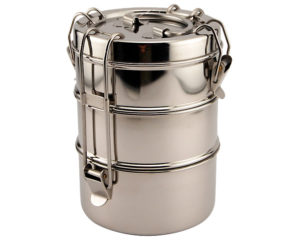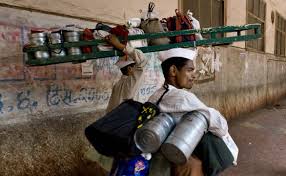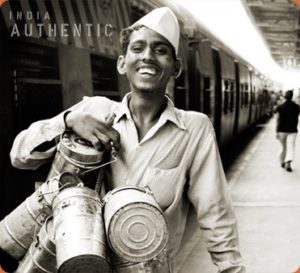200,000 Lunch Pails

Greetings friends,
If you asked a Silicon Valley techno-geek to devise a program that would organize the delivery of around 200,000 lunch pails, picked up from individual homes daily before 10 A M and delivered to the customers at work, then, hours later, picked up again and returned back to their homes before 6 P M, with a failure rate of less than one percent… well… we can only imagine the complicated algorithm this project would generate.
Adding to the difficulty, these lunches must traverse Mumbai, India, a city of nearly 12 million people, by bicycle, train, and sandaled foot, often delivered to the tenth or twelfth floor of an antiquated office building that has no elevator.
Another minor issue is that the train system in Mumbai is among the most dangerous in the world. Every day
, 7.5 million people commute in incredibly cramped coaches that ride over broken down rails. In 2015
, 3304 people were killed. Most train stations are equipped with morgues to handle the bodies.

This lunch delivery work has been done since 1890
, without input from time-and-motion experts or computer geeks, by a group known as dabbawalas. The Hindu name, roughly translated, means “One who carries a box.”

The service is necessary because Mumbai office workers leave home so early there is nobody awake to cook their meals, and they are so loaded with work stuff, and their ride to work is so treacherous, that they can’t carry another item.

Eating out at lunch is too expensive for most, and they consider office cafeteria food to be of inferior quality. Many are vegetarians with strict dietary requirements. So the meal must be prepared at home
, picked up by the dabbawalas, grouped together at various checkpoints around the city, and routed from there to their destinations, some more that 30 miles away.
“The dabbawalas use a complex system of collection teams, sorting points, and delivery zones and a completely manual system of routing the right meal to the right destination.”
This task is carried out mostly by men who can’t read, so the entire process is done without a shingle sheet of paperwork. The lunch pails, known as tiffins, are color-coded to direct their delivery and return, all with a system that has been studied by business biggies in America and Europe who hope to learn from the system’s efficient simplicity.

The dabbawalas pay is around 8000 Rupees (roughly $131 per month). Their jobs are handed down over generations and require a six-month apprenticeship. Although the system has an official hierarchy
, the dabbawalas work without supervision and consider themselves to be free men, relishing the fact that they work without bosses.
Though their work provides an essential service to Mumbai residents, the dabbawalas are guided by a deeply-held spiritual tradition.
“The Tiffin delivery system is not only supported by a complex logistics system. but also by a specific moral code. Their code is an expression of the interrelationship between a specific manifestation of the Hindu faith, which can be traced back to the Varkari Sampradaya Sect, and India’s unique cultural philosophy. The sect places food at the center of its philosophy, considering it to be a metaphor for life and its primary material impulses and aspirations.”

The dabbawalas believe that delivering food is much more that just a way of making a living. Their mantra is,
“Food is God. Work is worship”
In an age whose primary gods are money and shallow fame, it’s gratifying to know there are people guided by such noble views.

Sources;
3304 Deaths On Mumbai Locals. thehindu.com
, Jan 27, 2016
Dabbawala: Ethics in Transition. Open Book Publications. openbook.org
In India, Grandma Cooks, They Deliver. NY Times, May29, 2007
Dabbawalas: Mumbai’s Lunchbox Carriers. Financial Times, June 31, 2015